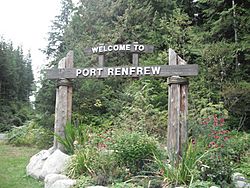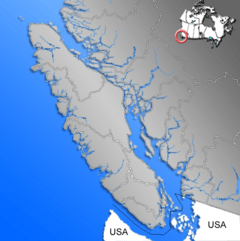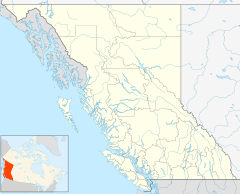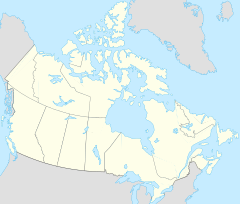Port Renfrew facts for kids
Quick facts for kids
Port Renfrew
|
|
|---|---|
 |
|
| Nickname(s):
The Land of Plenty, The Tall Tree Capital of Canada
|
|
| Country | Canada |
| Province | British Columbia |
| Area | |
| • Land | 8.69 km2 (3.36 sq mi) |
| Population
(2021)
|
|
| • Total | 262 |
| • Density | 16.6/km2 (43/sq mi) |
| Postal code |
V0S 0A1 & V0S 1K0
|
| Website | https://www.portrenfrew.com |
Port Renfrew is a small community on the west coast of Vancouver Island in British Columbia, Canada. It sits on the south shore of Port San Juan, which is an inlet (a narrow arm of the sea). Only about 262 people live here (based on the 2021 Canadian census). Port Renfrew is famous for its huge trees and is even called "the Tall Tree Capital of Canada"!
Contents
History of Port Renfrew
Port Renfrew was first called Port San Juan. Its name was changed to honor Lord Renfrew, who wanted to settle farmers there. The name change happened because mail kept going to the San Juan Islands instead of the correct place. Even though the town's name changed, the inlet it sits beside is still called Port San Juan.
Like many towns along the coast of Vancouver Island, Port Renfrew has a long history of logging and fishing. These activities were very important for the community.
The Graveyard of the Pacific
Between 1830 and 1925, many ships had terrible accidents near the entrance to the Strait of Juan de Fuca. This part of the coastline, close to Port Renfrew, became known as the Graveyard of the Pacific. It was a very dangerous area for ships.
First Nations People
The Pacheedaht First Nation are the original people of this area. Their name means "People of the Sea Foam." They have traditional village sites in and around the main town of Port Renfrew.
Geography and Location
Port Renfrew is located at the very end of the Port San Juan inlet. It is right next to this natural harbor and the San Juan River. The other end of the inlet opens into the Strait of Juan de Fuca, which then connects to the Pacific Ocean. The San Juan Valley is to the northeast of the town, surrounded by mountains.
How to Get to Port Renfrew
You can reach Port Renfrew from Victoria by driving on British Columbia Highway 14. Another way to get there is from Lake Cowichan using the Pacific Marine Road.
Port Renfrew's Climate
Port Renfrew has an oceanic climate. This means it has mild temperatures all year round. Summers are warm but not too hot, and winters are mild. It is one of the mildest places in all of Canada during winter. The area also gets a lot of rain, especially in the cooler months.
| Climate data for Port Renfrew Climate ID: 1016335; coordinates 48°35′30″N 124°19′35″W / 48.59167°N 124.32639°W; elevation: 10.0 m (32.8 ft); 1981-2010 normals |
|||||||||||||
|---|---|---|---|---|---|---|---|---|---|---|---|---|---|
| Month | Jan | Feb | Mar | Apr | May | Jun | Jul | Aug | Sep | Oct | Nov | Dec | Year |
| Record high °C (°F) | 19.0 (66.2) |
16.5 (61.7) |
20.0 (68.0) |
24.5 (76.1) |
27.5 (81.5) |
31.0 (87.8) |
31.7 (89.1) |
33.5 (92.3) |
28.9 (84.0) |
24.0 (75.2) |
17.2 (63.0) |
15.0 (59.0) |
33.5 (92.3) |
| Mean daily maximum °C (°F) | 6.3 (43.3) |
7.5 (45.5) |
9.7 (49.5) |
12.3 (54.1) |
15.2 (59.4) |
17.4 (63.3) |
19.4 (66.9) |
20.0 (68.0) |
17.8 (64.0) |
12.9 (55.2) |
8.5 (47.3) |
5.9 (42.6) |
12.7 (54.9) |
| Daily mean °C (°F) | 4.1 (39.4) |
4.6 (40.3) |
6.2 (43.2) |
8.4 (47.1) |
11.1 (52.0) |
13.4 (56.1) |
15.3 (59.5) |
15.6 (60.1) |
13.4 (56.1) |
9.6 (49.3) |
6.1 (43.0) |
3.8 (38.8) |
9.3 (48.7) |
| Mean daily minimum °C (°F) | 1.8 (35.2) |
1.6 (34.9) |
2.7 (36.9) |
4.3 (39.7) |
6.9 (44.4) |
9.4 (48.9) |
11.0 (51.8) |
11.1 (52.0) |
9.0 (48.2) |
6.3 (43.3) |
3.7 (38.7) |
1.6 (34.9) |
5.8 (42.4) |
| Record low °C (°F) | −12.5 (9.5) |
−10.5 (13.1) |
−6.7 (19.9) |
−2.5 (27.5) |
0.0 (32.0) |
1.7 (35.1) |
5.0 (41.0) |
2.2 (36.0) |
−0.6 (30.9) |
−3.5 (25.7) |
−11.5 (11.3) |
−11.1 (12.0) |
−12.5 (9.5) |
| Average precipitation mm (inches) | 555.7 (21.88) |
376.6 (14.83) |
362.3 (14.26) |
258.7 (10.19) |
154.7 (6.09) |
107.9 (4.25) |
50.5 (1.99) |
82.4 (3.24) |
123.9 (4.88) |
371.2 (14.61) |
579.7 (22.82) |
481.0 (18.94) |
3,504.6 (137.98) |
| Average rainfall mm (inches) | 544.0 (21.42) |
362.0 (14.25) |
356.0 (14.02) |
258.1 (10.16) |
154.6 (6.09) |
107.9 (4.25) |
50.5 (1.99) |
82.4 (3.24) |
123.9 (4.88) |
371.0 (14.61) |
575.4 (22.65) |
468.9 (18.46) |
3,454.7 (136.01) |
| Average snowfall cm (inches) | 11.8 (4.6) |
14.6 (5.7) |
6.3 (2.5) |
0.6 (0.2) |
0.1 (0.0) |
0.0 (0.0) |
0.0 (0.0) |
0.0 (0.0) |
0.0 (0.0) |
0.2 (0.1) |
4.3 (1.7) |
12.1 (4.8) |
50.0 (19.7) |
| Average precipitation days (≥ 0.2 mm) | 22.8 | 18.4 | 22.3 | 19.3 | 16.7 | 13.9 | 9.0 | 9.6 | 11.1 | 18.8 | 23.1 | 22.4 | 207.3 |
| Average rainy days (≥ 0.2 mm) | 22.1 | 17.8 | 22.0 | 19.3 | 16.7 | 13.9 | 9.0 | 9.6 | 11.1 | 18.8 | 22.8 | 21.5 | 204.7 |
| Average snowy days (≥ 0.2 cm) | 2.9 | 2.2 | 2.0 | 0.33 | 0.04 | 0.0 | 0.0 | 0.0 | 0.0 | 0.08 | 1.0 | 2.5 | 11.1 |
| Source: Environment and Climate Change Canada | |||||||||||||
Fun Things to Do in Port Renfrew
Port Renfrew is a great place for outdoor adventures! Since it's at the head of Port San Juan and the mouth of the San Juan River, you can enjoy many activities. These include fishing, kayaking, and watching birds. The mountains and coastline around the town have many hiking trails.
Popular Hiking Trails
- West Coast Trail: This famous trail is to the north of Port Renfrew.
- Juan de Fuca Marine Trail: You can find this trail to the southwest.
The San Juan Valley, located to the east, is home to many ancient forests. Here, you can see some of Canada's largest and oldest trees!
Attractions in Town
- Government Wharf: This is where Highway 14 ends. It's a good spot to see the harbor.
- Tall Tree Music Festival: This fun music festival happens every year on the last weekend of June. It started in 2010.
Nearby Places to Explore
- Avatar Grove: This is an old-growth forest that has been protected by the Ancient Forest Alliance. It's a great place to see huge, ancient trees.
- Juan de Fuca Provincial Park: A beautiful park with trails and coastal views.
- Pacific Rim National Park Reserve: Another amazing national park known for its wild coastline and rainforests.
- San Juan River Estuary Ecological Reserve: A special area that protects the natural environment where the San Juan River meets the inlet.
 | Percy Lavon Julian |
 | Katherine Johnson |
 | George Washington Carver |
 | Annie Easley |




